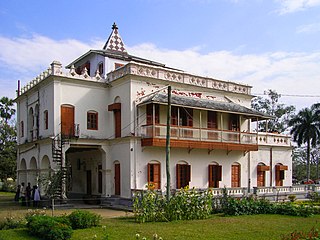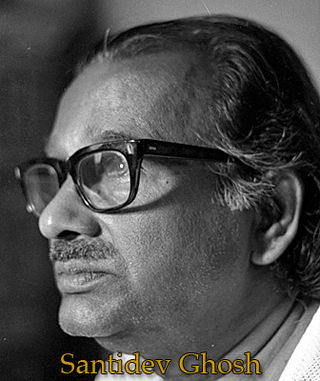Dancing Girl may refer to:

Shantiniketan is a neighbourhood of Bolpur town in the Bolpur subdivision of Birbhum district in West Bengal, India, approximately 152 km north of Kolkata. It was established by Maharshi Devendranath Tagore, and later expanded by his son, Rabindranath Tagore whose vision became what is now a university town with the creation of Visva-Bharati. It is also the birthplace of Amartya Sen, an Economist, Philosopher, & Nobel Laureate
Gurudeva is a generic address to a guru in Hinduism.

The works of Rabindranath Tagore consist of poems, novels, short stories, dramas, paintings, drawings, and music that Bengali poet and Brahmo philosopher Rabindranath Tagore created over his lifetime.

Nastanirh is a 1901 Bengali novella by Rabindranath Tagore. It is the basis for the noted 1964 film Charulata, by Satyajit Ray.

Rabindranath Tagore was a Bengali poet, writer, playwright, composer, philosopher, social reformer, and painter of the Bengal Renaissance. He reshaped Bengali literature and music as well as Indian art with Contextual Modernism in the late 19th and early 20th centuries. Author of the "profoundly sensitive, fresh and beautiful" poetry of Gitanjali, in 1913 Tagore became the first non-European and the first lyricist to win the Nobel Prize in Literature. Tagore's poetic songs were viewed as spiritual and mercurial; where his elegant prose and magical poetry were widely popular in the Indian subcontinent. He was a fellow of the Royal Asiatic Society. Referred to as "the Bard of Bengal", Tagore was known by the sobriquets Gurudeb, Kobiguru, and Biswokobi.

Santidev Ghose was an Indian author, singer, actor, dancer and maestro of Rabindra Sangeet.

Shesher Kabita is a novel by Rabindranath Tagore. The novel was serialised in 1928, from Bhadra to Choitro in the magazine Probashi, and was published in book form the following year. It has been translated into English as The Last Poem and Farewell song.
Chaturanga is an ancient Indian game, the ancestor of chess.
The Gardener may refer to:
Rabindranath Tagore (1861–1941) was a Bengali poet, writer, composer, philosopher, social reformer and painter.

Natir Puja is the only film where Rabindranath Tagore is credited as director. This film is a recording of Tagore's 1926 stage dance-drama of the same name.

Kala Bhavana is the fine arts faculty of Visva-Bharati University, in Shantiniketan, India. It is an institution of education and research in visual arts, founded in 1919, it was established by Nobel laureate Rabindranath Tagore.
Dak Ghar 1965 Bollywood film based on an eponymous 1912 play by Rabindranath Tagore. It was directed by Zul Vellani and starred Sachin, Mukri, AK Hangal, Sudha and Satyen Kappu among others, with cameo appearances by Balraj Sahni and Sharmila Tagore.
A post office is a facility that is part of a postal network.
Kabuliwallah may refer to:
Kabuliwala, is a Bengali short story written by Rabindranath Tagore in 1892, during Tagore's "Sadhana" period from 1891 to 1895. The story is about a fruit seller, a Pashtun from Kabul, Afghanistan, who visits Calcutta each year to sell dry fruits. While living in India, he develops a filial affection for a five-year-old girl, Mini, from a middle-class aristocratic family, who reminds him of his own daughter back home in Afghanistan.

Stories by Rabindranath Tagore is a 2015 Indian Hindi-language television series which aired on the Epic channel. It is directed by Anurag Basu.
Below is a list of adaptations of works of Rabindranath Tagore in film and television.

Bioscopewala is an Indian Hindi-language drama film directed by Deb Medhekar, and produced by Sunil Doshi. The film stars Danny Denzongpa and Geetanjali Thapa in lead roles and had its world premiere at the 30th Tokyo International Film Festival on 28 October 2017. The film is an adaptation of Nobel Laureate Rabindranath Tagore's 1892 short story Kabuliwala and released on 25 May 2018 in India. The official trailer of the film was released on YouTube by Fox Star Studios on 8 May 2018. Bioscopewala has taken forward the timeline of Kabuliwala, the original story written by Rabindranath Tagore, from the 19th century to somewhere in the 1980s during the Taliban regime and changed the profession of Rehmat, the central character, from a dry fruit seller to a man who goes around showing films to children through his bioscope.